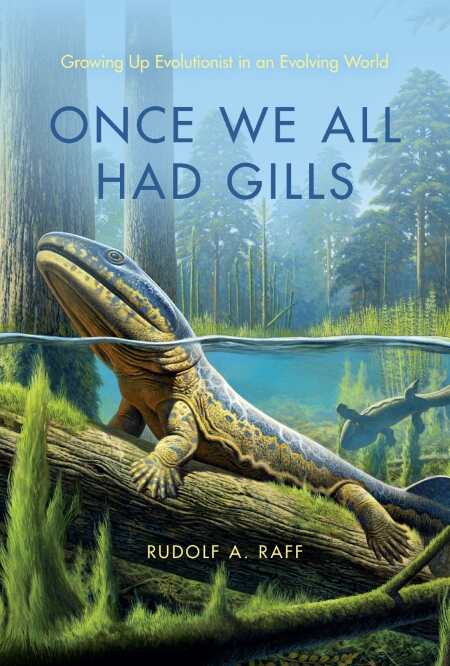Once We All Had Gills
Growing up Evolutionist in an Evolving World
This book is about the evolution of a scientist, the science of evolution, and the evolution of science itself. Rudolf A. Raff, Distinguished Professor of Biology at Indiana University, traces his interest in science to boyhood summers at his grandparents’ cottage in the Canadian countryside, where he developed a fascination for snakes, salamanders, and spiders. As an eight year old, Raff’s family moved to Pittsburgh near the Carnegie Museum, with its rich collection of dinosaurs, and where Raff worked as a volunteer in high school.
As Raff recounts his continuing education and research, he shares some great adventure stories about his travels to places such as Mexico and Australia for fieldwork. Along the way we are treated to fascinating tidbits, such as the fact that the Jesus Christo lizard in Mexico can run upright on water.
“I have never had a formal course in evolution, and my becoming an evolutionary biologist came as a result of my reading as I became a molecular developmental biologist. I only later came to do research on the relationship between developmental biology and evolution,” explains the author. Dr. Raff continues to relate how his work led to the founding of a new branch of study, the fusion of evolutionary and developmental biology.
The stories are set in the context of what is happening in the country at the time: the war in Vietnam, the civil rights struggle, and the difficulties his wife encountered as a woman scientist. But Raff’s prevailing concern is the antiscience bent of a significant part of the American public and politicians, especially creationists and global climate change deniers.
In the last section of the book, Dr. Raff cites a 2009 poll showing that only 36 percent of Americans accept evolution and 39 percent accept that global warming exists, yet 55 percent believe in angels. He exhorts scientists to become communicators, to help teach our society about science before human activities make it uninhabitable for our own species as well as for many, if not all, others.
Science teachers and students, as well as working scientists and laypersons with some knowledge of biology, will find this an interesting and inspiring book, not only about the life and work of a scientist, but the importance of science to society as well.
Rudolf A. Raff is also author of The Shape of Life: Genes, Development, and Evolution of Animal Form and author (with Thom Kaufman) of Embryos, Genes, and Evolution.
Reviewed by
Karen Mulvahill
Disclosure: This article is not an endorsement, but a review. The publisher of this book provided free copies of the book to have their book reviewed by a professional reviewer. No fee was paid by the publisher for this review. Foreword Reviews only recommends books that we love. Foreword Magazine, Inc. is disclosing this in accordance with the Federal Trade Commission’s 16 CFR, Part 255.

